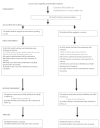Short structured general mental health in service training programme in Kenya improves patient health and social outcomes but not detection of mental health problems - a pragmatic cluster randomised controlled trial
- PMID: 24188964
- PMCID: PMC4174904
- DOI: 10.1186/1752-4458-7-25
Short structured general mental health in service training programme in Kenya improves patient health and social outcomes but not detection of mental health problems - a pragmatic cluster randomised controlled trial
Abstract
Trial design: A pragmatic cluster randomised controlled trial.
Participants: Clusters were primary health care clinics on the Ministry of Health list. Clients were eligible if they were aged 18 and over.
Interventions: Two members of staff from each intervention clinic received the training programme. Clients in both intervention and control clinics subsequently received normal routine care from their health workers.
Objective: To examine the impact of a mental health inservice training on routine detection of mental disorder in the clinics and on client outcomes.
Outcomes: The primary outcome was the rate of accurate routine clinic detection of mental disorder and the secondary outcome was client recovery over a twelve week follow up period. Randomisation: clinics were randomised to intervention and control groups using a table of random numbers. Blinding: researchers and clients were blind to group assignment.
Results: Numbers randomised: 49 and 50 clinics were assigned to intervention and control groups respectively. 12 GHQ positive clients per clinic were identified for follow up. Numbers analysed: 468 and 478 clients were followed up for three months in intervention and control groups respectively.
Outcome: At twelve weeks after training of the intervention group, the rate of accurate routine clinic detection of mental disorder was greater than 0 in 5% versus 0% of the intervention and control groups respectively, in both the intention to treat analysis (p = 0.50) and the per protocol analysis (p =0.50). Standardised effect sizes for client improvement were 0.34 (95% CI = (0.01,0.68)) for the General Health Questionnaire, 0.39 ((95% CI = (0.22, 0.61)) for the EQ and 0.49 (95% CI = (0.11,0.87)) for WHODAS (using ITT analysis); and 0.43 (95% CI = (0.09,0.76)) for the GHQ, 0.44 (95% CI = (0.22,0.65)) for the EQ and 0.58 (95% CI = (0.18,0.97)) for WHODAS (using per protocol analysis).
Harms: None identified.
Conclusion: The training programme did not result in significantly improved recorded diagnostic rates of mental disorders in the routine clinic consultation register, but did have significant effects on patient outcomes in routine clinical practice.
Trial registration: International Standard Randomised Controlled Trial Number Register ISRCTN53515024.
References
-
- Ustun TB, Sartorius N. Mental Illness in General Health Care: An International Study. Chichester: Wiley; 1995.
-
- Patel V, Weiss HA, Chowdhary N, Naik S, Pednekar S, Chatterjee S, De Silva MJ, Bhat B, Araya R, King M. et al.Effectiveness of an intervention led by lay health counsellors for depressive and anxiety disorders in primary care in Goa, India (MANAS): a cluster randomised controlled trial. Lancet. 2010;376:2086–2095. - PMC - PubMed
-
- World Health Organisation. Mental Health Atlas. Geneva: World Health Organisation; 2005. http://www.who.int/globalatlas/pgrms/mentalhealth.
-
- Zarocostas J. African countries need to allocate more of their budgets to health, says WHO. Brit Med J. 2011;342:1280.
LinkOut - more resources
Full Text Sources
Other Literature Sources


